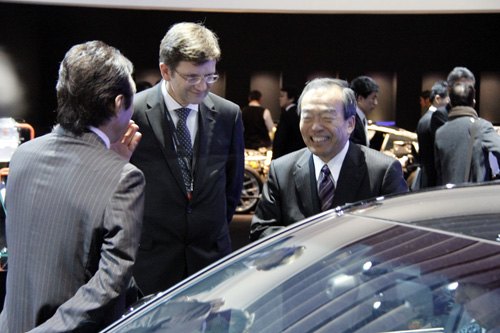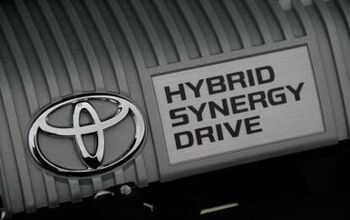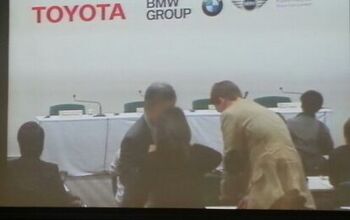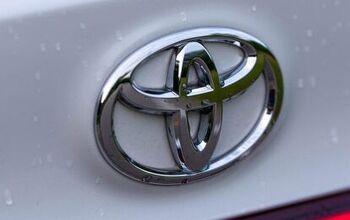Toyota And BMW To Announce Hydrogen-Alliance

Will meet again: Fröhlich and Uchiyamada
Rumors are floating around in Tokyo that Toyota and BMW are about to enter an agreement where Toyota will provide its fuel cell technology to the Bavarian maker. The Nikkei [sub] says BMW plans to build a hydrogen prototype by 2015, and wants to have a hydrogen car ready for market by 2020. Other carmakers, Toyota included, plan a limited market release in the “hydrogen year” 2015, with hopes for volume production by 2020.
Toyota spokesfolk did not want to comment, then sent out an invitation for a press conference tomorrow, Thursday, in Nagoya. BMW also happens to be there. Looking at the executives in attendance, it does not appear like a meeting where joint windshield wiper procurement is discussed: On the BMW side will be Klaus Fröhlich, Strategy SVP at BMW and chief ideologue, along with development chief Dr. Herbert Diess. The Toyota side will be similarly high tech-laden with Toyota’s “father of the Prius” Takeshi Uchiyamada in attendance. Yasumori Ihara will represent Toyota Purchasing and the board. TTAC will also be there.
The move does not come as a surprise to us. Last June, we told you that “BMW will get access to Toyota’s fuel cell technologies” and that this will be “the end of the fuel cell cooperation between BMW and GM.” We told you that Toyota is far ahead with the technology. TTAC even had a short hydrogen-powered test ride through the scenic warehouse landscape of Torrance, CA. We told you that current fuel cell technology is big, bulky, heavy and expensive, and that Toyota is working on bringing package size and price down to tolerable levels. We’ll know more tomorrow.

Bertel Schmitt comes back to journalism after taking a 35 year break in advertising and marketing. He ran and owned advertising agencies in Duesseldorf, Germany, and New York City. Volkswagen A.G. was Bertel's most important corporate account. Schmitt's advertising and marketing career touched many corners of the industry with a special focus on automotive products and services. Since 2004, he lives in Japan and China with his wife <a href="http://www.tomokoandbertel.com"> Tomoko </a>. Bertel Schmitt is a founding board member of the <a href="http://www.offshoresuperseries.com"> Offshore Super Series </a>, an American offshore powerboat racing organization. He is co-owner of the racing team Typhoon.
More by Bertel Schmitt
Latest Car Reviews
Read moreLatest Product Reviews
Read moreRecent Comments
- Probert They already have hybrids, but these won't ever be them as they are built on the modular E-GMP skateboard.
- Justin You guys still looking for that sportbak? I just saw one on the Facebook marketplace in Arizona
- 28-Cars-Later I cannot remember what happens now, but there are whiteblocks in this period which develop a "tick" like sound which indicates they are toast (maybe head gasket?). Ten or so years ago I looked at an '03 or '04 S60 (I forget why) and I brought my Volvo indy along to tell me if it was worth my time - it ticked and that's when I learned this. This XC90 is probably worth about $300 as it sits, not kidding, and it will cost you conservatively $2500 for an engine swap (all the ones I see on car-part.com have north of 130K miles starting at $1,100 and that's not including freight to a shop, shop labor, other internals to do such as timing belt while engine out etc).
- 28-Cars-Later Ford reported it lost $132,000 for each of its 10,000 electric vehicles sold in the first quarter of 2024, according to CNN. The sales were down 20 percent from the first quarter of 2023 and would “drag down earnings for the company overall.”The losses include “hundreds of millions being spent on research and development of the next generation of EVs for Ford. Those investments are years away from paying off.” [if they ever are recouped] Ford is the only major carmaker breaking out EV numbers by themselves. But other marques likely suffer similar losses. https://www.zerohedge.com/political/fords-120000-loss-vehicle-shows-california-ev-goals-are-impossible Given these facts, how did Tesla ever produce anything in volume let alone profit?
- AZFelix Let's forego all of this dilly-dallying with autonomous cars and cut right to the chase and the only real solution.


































Comments
Join the conversation
There are no pure hydrogen molecules on earth. Hydrogen is very abundant, but is tightly bonded with other elements. Reversing that chemical bond takes a lot of energy. Methane appears to be the least inefficent method of obtaining pure hydrogen. Reforming hydrogen from methane removes the carbon molecule. This has two drawbacks: 1- How are you going to eventually dispose of all the carbon? Burn it? 2- The energy released from oxydizing carbon is very large. Removing the carbon molecule means that you've lost a significant amount of useful energy from methane. Hydrogen-fueled vehicles are an even longer stretch of the imagination than a pure battery powered vehicle. This is an example of green extremism gone amok.
Deja vu. I feel like I've seen the same stories and had the same discussion in 2001.